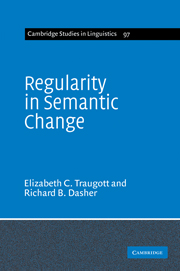Book contents
- Frontmatter
- Contents
- List of figures
- Preface and Acknowledgments
- Conventions
- List of abbreviations
- 1 The framework
- 2 Prior and current work on semantic change
- 3 The development of modal verbs
- 4 The development of adverbials with discourse marker function
- 5 The development of performative verbs and constructions
- 6 The development of social deictics
- 7 Conclusion
- Primary references
- Secondary references
- Index of languages
- Index of names
- General index
4 - The development of adverbials with discourse marker function
Published online by Cambridge University Press: 22 September 2009
- Frontmatter
- Contents
- List of figures
- Preface and Acknowledgments
- Conventions
- List of abbreviations
- 1 The framework
- 2 Prior and current work on semantic change
- 3 The development of modal verbs
- 4 The development of adverbials with discourse marker function
- 5 The development of performative verbs and constructions
- 6 The development of social deictics
- 7 Conclusion
- Primary references
- Secondary references
- Index of languages
- Index of names
- General index
Summary
Introduction
In this chapter we move to the development of pragmatic meanings of adverbials (ADVs). The main function of the subclass of ADVs in question, e.g. in fact, after all, so, then, well, Jp. sate “well,” sunawati “namely, in other words,” in some of their uses, is to signal an aspect of the speaker's rhetorical stance toward what he or she is saying, or toward the addressee's role in the discourse situation. They have little conceptual semantics, and do not contribute significantly to the truth-conditional meaning of propositions, hence some researchers have considered them a subset of “pragmatic markers” or “metatextual particles.” However, they mark the speaker's view of the sequential relationship between units of discourse, that is, they serve as connectives between utterances. They are widely known as “discourse markers” (Fraser 1988) or “discourse connectives” (Blakemore 1987). The ones of primary interest to us here have modal properties, in that they reflect aspects of the speaker's epistemic (information and belief-state) stance toward the sequencing of the discourse; they also have deictic properties in that they index the speaker's viewpoint on the proximity or distance within the world created in the text, and do both anaphoric and cataphoric work (Schiffrin 1990b).
There are several other types of pragmatic markers, including those that signal narrative structure.
- Type
- Chapter
- Information
- Regularity in Semantic Change , pp. 152 - 189Publisher: Cambridge University PressPrint publication year: 2001
- 1
- Cited by



